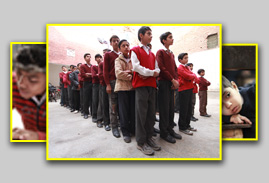09 April 2011
When the March for Education Campaign was launched, exactly a month back, we asked you to help us make March the month that Pakistan talks about only two things: education and cricket and all of you did help us and are continuing to do so. Not only do we have over 150 thousand petitions signatures (and counting) we have been covered by a great number of media organizations.
Locally, all the major newspapers such as The News, Dawn, Express Tribune, Daily Times, Pakistan Today, The Nation, Nawa-i-Waqt, Business Recorder, Daily Express, Daily Ausaaf and Pakistan Observer have covered the news; have published opinion pieces and written editorial supporting the campaign. The foreign publications that have covered the campaign are Guardian, Khaleej Times, Independent, Al Jazeerah, Inter Press Services, IBN, The India, Yahoo India, Qatar Peninsula, New Kerala, India gazette, Cambodian Express and Samachar Express to name a few.
The message that we wanted to convey was that no country will ever enjoy security or robust economic growth without quality education, and the fact that education emergency in Pakistan is now a threat to country’s survival. Pakistani government has to get its priorities right and needs to set aside a decent percentage of its GDP, a minimum of 4 percent for education. Pouring money into education is the only way to achieve its long-term security and the best antidote to terror. The case for education has been made, now the political leadership needs to step up and take the lead.
17 March 2011
President Asif Ali Zardari has termed the state of education in his native province an ‘education emergency’. On March 15th, during a meeting with Pir Mazhar-ul-Haq, the minister for education and literacy in Sindh, President Zardari expressed distress at the wretched state of public education and tasked the provincial education minister to prepare a comprehensive and workable plan and propose steps to meet this emergency in the province.
President Zardari called for innovative ideas to deal with the education emergency and suggested that management partnership with the private sector should be explored for an efficient running of the school system. He also called for the adoption of ground-breaking ways to generate funds and improve oversight of the educational institutions.
The campaign is very pleased to note that the President has taken notice of the shortcomings in the education sector and is terming the situation as an emergency and is asking the concerned ministries to improve the situation. In order to achieve outstanding and long term results, we need the leadership of the country to actively pursue change through policy, investment and political consensus. President’s keen interest education is the first step in implementing change which can impact the lives and futures of nearly sixty million children between the ages of 5 and 16.
15 March 2011
In the second pamphlet, Sir Michael Barber, co chair of Pakistan Education Task Force, reiterates that things can improve in Pakistan’s education system if the leaders believe in change and have the courage to take the problem heads on.
Sir Michael draws from his experience in other countries and suggests that reforms agenda takes off when either a political or economic crisis forces the governments to redesign their education program, or a ground-breaking report forces the government to take notice of the seriousness of a country’s educational challenges, or a visionary leader takes it upon him or herself to bring reform to the education sector.
Read the full text ‘Lessons in Education Reforms for Pakistan’
15 March 2011
The March for Education campaign releases the first pamphlet where Mosharraf Zaidi highlights the importance of political engagement in improving the state of education in Pakistan.
The writer believes that political will is required to restate the urgency of education reform and that can only be achieved when the voter and tax payers vociferously demand for that change. The writer suggests that all political parties must come together in a forum that will allow them to develop a consensus on how to make the constitutional right to an education a reality.
Read the complete pamphlet on ‘The Politics of Education Reforms’






















































